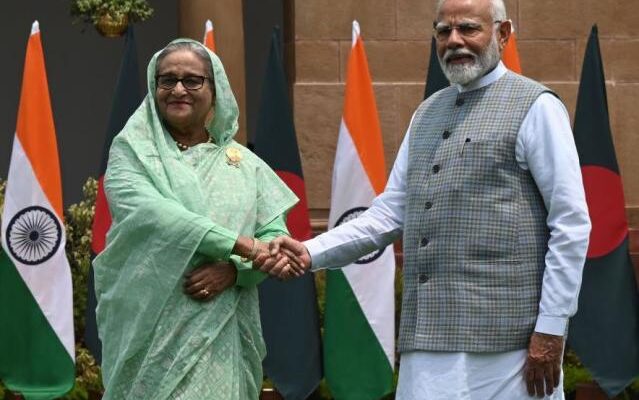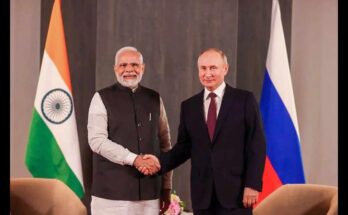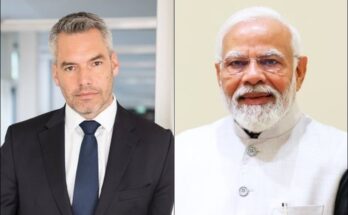The resignation of Bangladesh’s long-serving prime minister Sheikh Hasina and her subsequent departure to India highlight the close ties between the two neighboring countries.
Ms. Hasina led Bangladesh, a nation of 170 million, for nearly 15 years until student protests against civil service quotas evolved into a broader and more violent anti-government movement. Clashes between police and protesters have resulted in at least 280 deaths.
In June, Ms. Hasina visited India twice within two weeks. Her first visit was to attend Indian Prime Minister Narendra Modi’s oath-taking ceremony. This was followed by a two-day state visit, marking the first by a head of government to India after Mr. Modi’s Bharatiya Janata Party-led coalition secured its third consecutive parliamentary election victory.
“We have met 10 times in the last one year. However, this meeting is special because Sheikh Hasina is the first state guest after the third term of our government,” Mr. Modi remarked during a joint news conference. Ms. Hasina echoed this sentiment, stating, “Bangladesh greatly values its relations with India.”
India and Bangladesh share a 4,096 km (2,545 miles) border and enjoy strong linguistic, economic, and cultural ties. Bangladesh, formerly East Pakistan, gained independence in 1971 with India’s support for Bengali nationalists. Bilateral trade between the nations stands at approximately $16 billion (£12 billion), with India being Bangladesh’s top export destination in Asia.
However, the ties are not without their challenges. Issues such as Bangladesh’s close relationship with China, border security, migration concerns, and some Bangladeshi officials’ unease with Mr. Modi’s Hindu nationalist politics occasionally strain relations.
Following Ms. Hasina’s resignation, Bangladesh’s army chief Waker-uz-Zaman announced plans for an interim government. He is set to meet President Mohammed Shahabuddin and engage with opposition parties, led by the Bangladesh Nationalist Party (BNP), to seek a resolution. The leadership of the interim government remains uncertain.
India has so far described the violent protests as an “internal matter” of Bangladesh. “Nothing. Nothing for now,” commented Happymon Jacob, an Indian foreign policy expert, on social media regarding India’s potential actions. “It is still unfolding. And, it’s not about India; it’s about politics in Bangladesh. Let them figure it out.”
Michael Kugelman of the Wilson Center in the United States described Ms. Hasina’s resignation and flight as “close to a worst-case scenario for India.” He noted that India has long viewed alternatives to Ms. Hasina and her party as threats to Indian interests and would likely reach out to Bangladesh’s military to convey its concerns, hoping that its interests are considered in any interim government.
Ms. Hasina’s sudden departure would have been unexpected for her allies. Daughter of Bangladesh’s founding president and the world’s longest-serving female head of government, she led the country for nearly 15 years, overseeing substantial economic growth and improved living standards. However, her tenure was also marked by accusations of forced disappearances, extrajudicial killings, and repression of the opposition, which she and her party, Awami League, denied.
In January, Ms. Hasina won her fourth consecutive term in a controversial election, boycotted by the opposition BNP amid allegations of electoral fraud and mass arrests of its leaders and supporters.
Some anti-India sentiment in Bangladesh stems from India’s support for Ms. Hasina’s government, perceived by critics as interference in domestic politics. Historical grievances and accusations of overreach contribute to negative perceptions.
Ali Riaz, a political scientist at Illinois State University, told the BBC that India’s silence is “not surprising as it has been the principal backer of the Hasina government for the past 14 years and contributed to the erosion of democracy in Bangladesh.” He added that India has benefited economically and views Ms. Hasina as crucial for maintaining Bangladesh within its sphere of influence.
India regards the current Bangladeshi opposition and its allies as “dangerous Islamic forces.” Ms. Hasina’s crackdown on anti-India militants and granting of transit rights for Indian trade routes underscored her alignment with Indian interests.
“A peaceful, stable, and prosperous Bangladesh is in India’s interests. India should do everything to ensure those conditions are maintained,” stated Harsh Vardhan Shringla, a former Indian foreign secretary and high commissioner to Bangladesh, hours before Ms. Hasina resigned.
The situation remains uncertain. “India doesn’t have too many options at this point in time,” a senior diplomat told the BBC. “We have to tighten control on our borders. Anything else would be construed as interference.”



